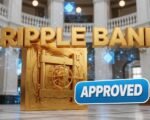Eric Trump revealed that his family turned to cryptocurrency after major banks closed their accounts following the 2021 Capitol attack. This move came as the Trump Organization faced what they called political pressure from the Biden administration, pushing them toward digital assets for financial independence.
The Debanking That Sparked Change
In early 2021, right after the January 6 Capitol riot, the Trump family experienced a major setback with their banking relationships. Eric Trump shared in a recent Wall Street Journal interview that hundreds of accounts linked to the Trump Organization were suddenly shut down without clear reasons.
This action left the family scrambling to find new banking options. They ended up relying on smaller regional banks before settling with a new provider. Eric described the experience as a wake-up call about how easily the traditional financial system could be used against them.
Reports suggest that banks like JPMorgan and Bank of America acted under influence from federal regulators. Sources indicate this was part of broader efforts to distance from figures tied to the Capitol events. The family viewed it as a targeted move, fueling their distrust in conventional banking.
The impact was not just on business accounts. Personal accounts for family members, including Melania and Barron Trump, faced similar closures. This widespread debanking highlighted vulnerabilities in the system and set the stage for their pivot to alternatives.

Why Crypto Became the Answer
Eric Trump explained that the debanking incident made the family see cryptocurrency as a safer option. He noted how industry experts pointed out similar pressures on crypto firms during the Biden era, where banks were urged to limit services to digital asset companies.
This realization came at a time when the crypto market was booming, offering tools for financial autonomy. The family learned that blockchain technology could bypass traditional gatekeepers, allowing direct peer-to-peer transactions without bank interference.
In public statements, Eric stressed that crypto represents freedom from what he called weaponized finance. He argued that if banks could close accounts for political reasons, digital currencies provided a way to protect assets and operations.
Don Jr. echoed this sentiment, saying the January 6 events led to nonsense that forced their hand. The shift was not just reactive but strategic, aiming to diversify away from systems prone to external pressures.
Experts in finance agree that debanking cases have risen, especially for politically exposed individuals. This trend has driven more people and businesses toward crypto as a hedge against such risks.
Key Trump Family Crypto Ventures
The Trump family’s involvement in crypto has grown rapidly since the debanking. They have launched several projects that blend their brand with digital assets, drawing both support and criticism.
World Liberty Financial stands out as a major initiative. Launched in late 2024, it offers a stablecoin called USD1 and lists Donald Trump as co-founder emeritus, with his sons as key figures.
Another venture is American Bitcoin, a partnership with mining firm Hut 8. This subsidiary raised over $220 million to buy Bitcoin and mining equipment, positioning the family in the growing Bitcoin sector.
- World Liberty Financial: Focuses on stablecoins and tokenization of assets like real estate.
- American Bitcoin: Invests in mining operations and holds significant Bitcoin reserves.
- Official Memecoin: A token tied to Donald Trump, launched around his inauguration.
These efforts have boosted the family’s wealth. Recent estimates show their net worth increased by about $2.9 billion from crypto investments, amid a surge in market values.
Critics argue these ventures exploit political ties for profit. However, supporters see them as innovative steps toward broader crypto adoption.
Political Ripples and Legal Battles
The family’s crypto push has stirred debates in Washington. Republican efforts to pass digital asset laws have hit snags, partly due to perceptions of favoritism toward Trump-linked projects.
In March 2025, the Trump Organization sued Capital One, claiming the bank closed accounts for political motives. The lawsuit seeks damages for financial harm caused by the abrupt closures.
This legal action underscores ongoing tensions between politics and finance. It also ties into claims that the Biden administration used Operation Chokepoint-like policies to pressure banks against crypto and certain clients.
On the policy front, the administration has paused several federal probes into crypto firms. This shift coincides with the family’s rising influence in the sector, raising questions about conflicts of interest.
Public sentiment, as seen in social media discussions, varies. Some praise the move as a stand against overreach, while others worry about self-enrichment.
Broader Impact on Finance and Crypto
The Trump family’s story highlights a growing trend where debanking drives adoption of decentralized finance. Tokenization of real-world assets, like refinancing properties through blockchain, is a key idea Eric Trump promotes.
He envisions a world where assets like Trump Tower could be tokenized for global investment, bypassing traditional barriers. This could reshape real estate and other industries.
Looking ahead, the family’s crypto ties may influence 2028 elections. Eric has hinted at potential runs by family members, blending politics with digital finance.
| Key Event | Date | Description |
|---|---|---|
| Capitol Riot | January 2021 | Triggered debanking of Trump accounts |
| Debanking Peak | Early 2021 | Hundreds of accounts closed by major banks |
| World Liberty Launch | September 2024 | Stablecoin and crypto platform introduced |
| Lawsuit Against Capital One | March 2025 | Claim of political motives in account closures |
| Net Worth Surge | May 2025 | $2.9 billion increase from crypto |
This table shows the timeline of events shaping their crypto journey.
Looking Forward
As crypto markets evolve, the Trump family’s role could expand. Their experience underscores the need for reforms in banking practices to prevent political weaponization.
Readers, what do you think about this shift? Share your thoughts in the comments and spread the word if you found this insightful.








